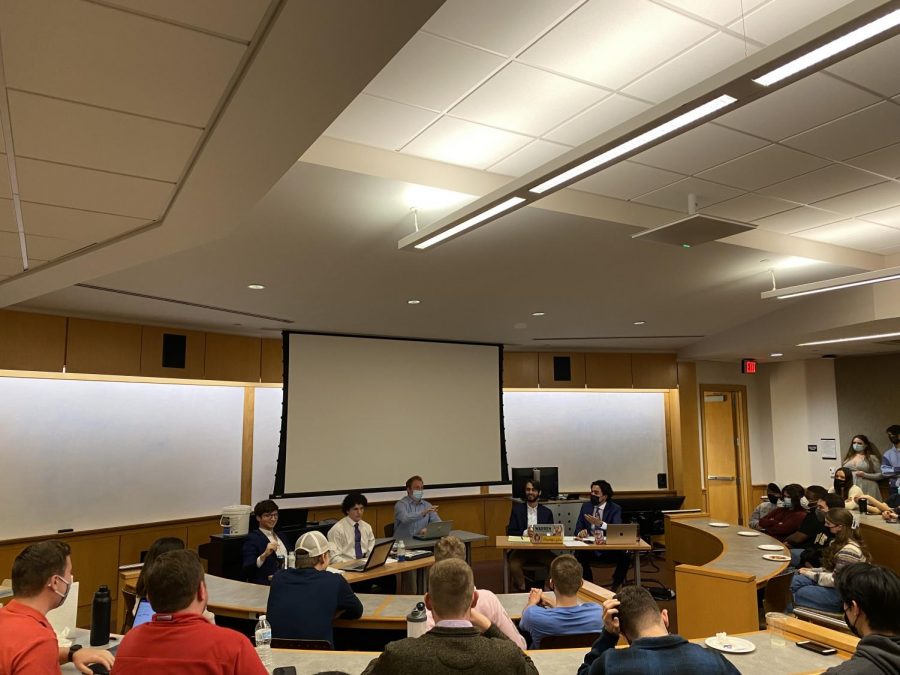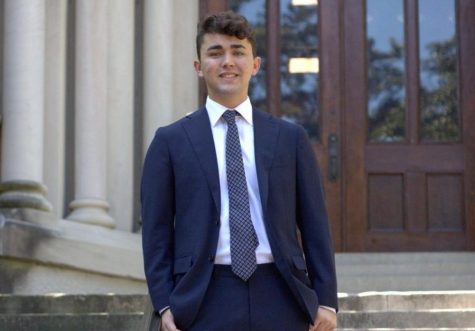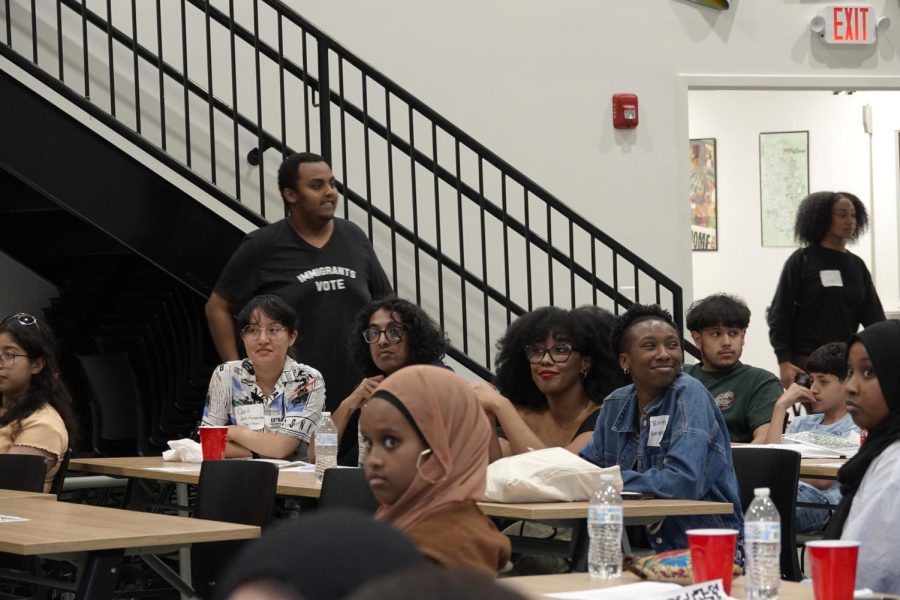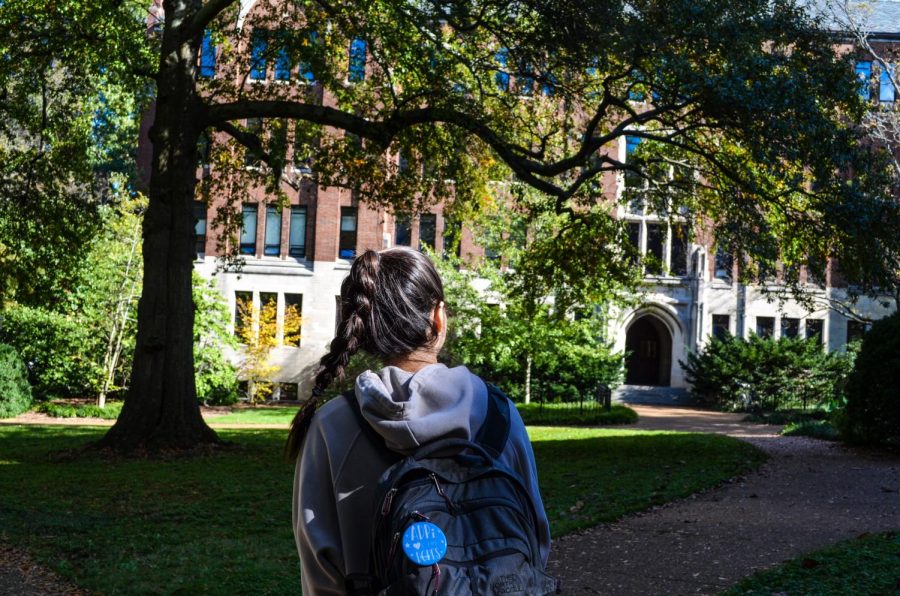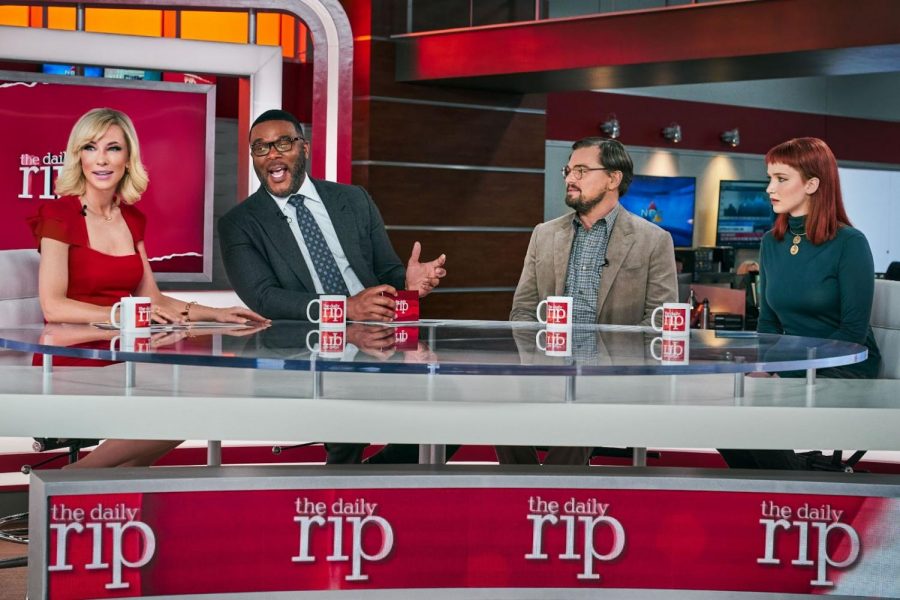CORRECTION: This story was updated on Oct. 29, 2021, at 5:45 p.m. CDT to accurately attribute quotes to debaters.
The Vanderbilt College Democrats (VCD) and Vanderbilt College Republicans (VCR) debated the Green New Deal in Kissam Student Center on Oct. 26.
The event was the first of the year between the two student groups and was attended by approximately 60 students. Senior Devon Shewell and first-year Jayce Pollard represented VCD, while sophomores Jordan Esrig and Alec Boulton represented VCR. Jacob Hale, editor-in-chief of the Vanderbilt Political Review (VPR), served as the moderator.
Debate structure
VCD argued in support of the Green New Deal, a 14-page proposal currently circulating in Congress that aims to curtail climate change, create jobs and minimize income inequality. VCR represented the negative, opposing the bill.
The debate began with four-minute opening remarks by one member of each group, followed by a three-minute period of open cross-examination. Then, the other member of each group provided a four-minute rebuttal and there was another three-minute questioning period. After this portion of the debate, the two sides participated in a three-minute summary and further rebuttal which was accompanied by three minutes of open discussion. There were two-minute conclusions from both parties at the end of the debate.
There was not enough time for audience questions due to argumentation during the questioning periods and speakers exceeding their time limits. For example, Shewell’s opening statements were 32 seconds too long.
“I liked that both sides were able to say their piece without being interrupted, but I think where it got a little messy was in the cross-examination because there wasn’t any structure to what types of questions were asked,” first-year audience member Lexi Abrams said.
Disagreement between groups
Shewell began the debate by requesting that VCR debaters wear face coverings to abide by university COVID-19 protocols since they weren’t actively eating or drinking. Esrig and Boulton then reached for their waters, saying “cheers.”
Multiple profanities were used throughout the debate by both groups. One instance occurred following Esrig’s claim that climate scientists have long been making false predictions, including when Al Gore said that there would be no ice caps by 2013.
“Is Al Gore a climate scientist?” Shewell said in response to Esrig. “Al Gore’s predictions don’t mean shit to me.”
There were also instances of personal insults during the debate. One such instance occurred when VCD said that toxic waste has been continually dumped on Indigenous land. VCR then questioned VCD about how the consent of Native Americans and the sovereignty of their land is related to climate change.
“I’m going to be honest: I really didn’t expect to hear a consent argument, but I suppose when you look like that you don’t really understand it,” Pollard said in response.
Hale made multiple reminders to both groups to focus on finding a resolution to whether or not the Green New Deal should be passed in Congress rather than engaging in off-topic dialogue.
“It was even more heated than I expected, which is saying something,” Vanderbilt Law School student Natalie Garcia said.
Esrig’s denial of the validity of climate science was another point of contention.
“[Climate science is] not a science like physics. It’s not a science like math,” Esrig said. “It’s pseudoscience.”
Platforms
Shewell and Pollard based their arguments on the lens of equity, beginning by outlining the threat of climate change. The pair supplemented this point by explaining the role they think the Green New Deal would play in setting commitments for the government to follow, such as net-zero carbon emissions by 2050, clean power plant initiatives and zero-emission vehicle infrastructure. They also explained that the proposal protects marginalized communities who are disproportionately affected by climate change by providing them with clean air and water.
“Homes are destroyed. Lives are uprooted,” Shewell said. “People will begin to see their everyday lives disappear. This is the nature of climate change.”
Esrig and Boulton centered their points around finding “modern” and “practical” solutions to climate change as an alternative to the Green New Deal.
“We do not deny that the climate is heating up and that humans have the capacity to decrease carbon emissions,” Esrig said. “What we are arguing for, however, is that the most effective ways of doing so are deliberately ignored by the Green New Deal in favor of more radical alternatives.”
VCR stated that carbon taxes and nuclear energy, for example, are more effective and less extreme solutions than the “hyperbolic restrictions” of the Green New Deal. They also delineated that only more economically developed countries, like the U.S., can commit to drastic fossil fuel reductions because of their widespread access to alternatives. Per Esrig and Boulton, less economically developed countries are unable to do the same.
Despite the debate’s failure to reach a clear resolution, VCR declared victory on their Instagram account.
“Victory feels oh so good!” VCR’s Instagram post’s caption reads. “Fun debate earlier tonight with the Vandy Dems!”
Per Shewell, the next debate has not been organized but will likely take place during the Spring 2022 semester.

